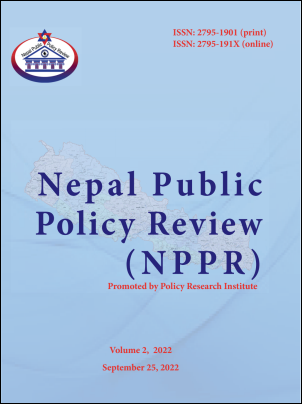Mapping Nepal's Foreign Policy Behaviour towards Great Power Politics: A Study of Nepal's Foreign Policy Response to the Russia-Ukraine Crisis
Keywords:
Nepal, Foreign policy behaviour, Russia-Ukraine Crisis, the USA, MCCAbstract
A country's foreign policy is characterised by continuity and change. A stark divergence, however, between stated foreign policy objectives and practically implemented foreign policy behaviours cannot be convincingly vindicated as a routine transformation. Nepal's foreign policy objectives and principles are laid down in the Constitution and various foreign policy documents, particularly in the integrated foreign policy of 2020. A series of perceptible deviations from those guiding principles, without any justifiable reason, may label Nepal's foreign policy behaviour as an adventurist project. Today, while the residue of Cold War politics has enveloped the Russia-Ukraine crisis, Nepal has divulged traceable foreign policy responses over the same. Taking the case study of Nepal's foreign policy responses to the Russia-Ukraine crisis, the study aims to map Nepal's foreign policy behaviour toward great power politics. Surveying Nepal's foreign policy behaviour towards the United Nations and the great powers, particularly the United States and Russia, this study, firstly, identifies the sources of key changes and detectible transformations in Nepal's foreign policy behaviour. Secondly, drawing a critical analysis of Nepal's responses to the great power politics to understand the foreign policy behaviour of Nepal that has been ambiguous, ambivalent, and uncertain. Methodologically, this qualitative study has employed the framework of Foreign Policy Analysis (FPA) along with inductive as well as deductive methods of reasoning per the nature of non-numerical data.
Downloads
Downloads
Published
How to Cite
Issue
Section
License
Copyright (c) 2022 Gaurav Bhattarai, Manish Jung Pulami

This work is licensed under a Creative Commons Attribution-NonCommercial 4.0 International License.




